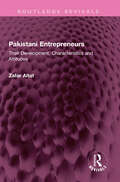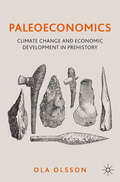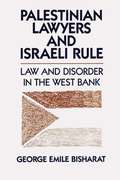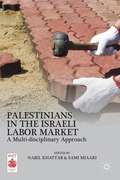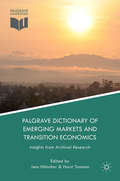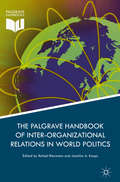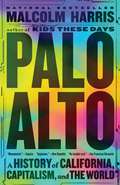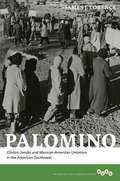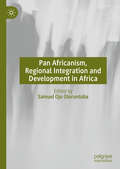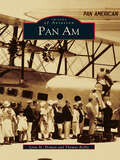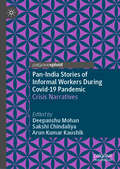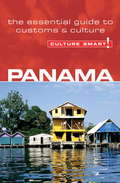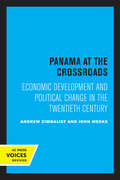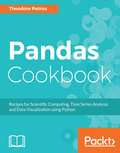- Table View
- List View
Pakistan: Monetary and Financial Policy Transparency, Banking Supervision, and Securities Regulation
by International Monetary FundA report from the International Monetary Fund.
Pakistan: Report on Observance of Standards and Codes--Data Module, Response by the Authorities, and Detailed Assessment Using Data Quality Assessment Framework
by International Monetary FundA report from the International Monetary Fund.
Pakistani Entrepreneurs: Their Development, Characteristics and Attitudes (Routledge Revivals)
by Zafar AltafFirst Published in 1983 Pakistani Entrepreneurs covers the role of the entrepreneur within Pakistan. His origins, religious and educational background, and family play a more important part in the development of the Pakistani entrepreneur than is the case with his western counterpart. In particular, the influence of caste was considered in the context of attitudes towards bargaining and credit, knowledge of and information on markets and raw materials. This is a systematic and probing study of efforts at Industrialisation in Pakistan, and of the way entrepreneurs have risen to the challenges of its offers. This book will be of interest to scholars and researchers of Pakistani economics, South Asian economics, and business economics.
Pal's Sudden Service-Scaling an Organizational Model to Drive Growth
by Gary P. Pisano Francesca Gino Bradley R. StaatsPal's Sudden Service has developed a unique operating model and organizational culture in the quick service restaurant business. With a deep emphasis on process control and improvement, zero defects, extensive training, and a high level of employee engagement, Pal's has been able to achieve excellent operating and financial performance. The case examines the challenges it potentially faces as it contemplates growing the chain significantly from the 28 units it currently operates.
Palace Hotel, The
by Richard HarnedWhen it opened in 1875, the Palace Hotel was the largest and most luxurious hotel in the world, a perfect symbol of one of the most remarkable eras in San Francisco history. Built at a time when Nevada's fabulously rich silver mines were pouring millions of dollars each month into San Francisco, it typified the color and grandiose extravagances of the whole bonanza period. After the original hotel was destroyed in the 1906 earthquake and fire, a successor Palace Hotel took its place and remains one of the most prestigious hotels in San Francisco today.
Paleoeconomics: Climate Change and Economic Development in Prehistory
by Ola OlssonThis accessible and insightful textbook provides a comprehensive introduction to the economics of prehistory. By presenting a chronological account of the beginnings of economics and human society, it charts the key developments in early human history, from the evolution of social norms and colonizing of unknown continents, to the development of early technology and the transition to agricultural food production. Particular attention is given to how human capital, the natural environment, social capital, and the spread of knowledge and technical skills propelled economic development during prehistory. The origin of modern concerns, including wealth inequality, stratified societies, and environmental change, are thoughtfully presented through the examining of the birth of the first states and human civilization. This book provides a thrilling account of human evolution and economic development from its African origins and hunter-gather days, through to the invention of agriculture and the rise of early states. Bringing together ideas from across economic history, the political economy, anthropology, and evolutionary biology, it will be relevant to students and general readers interested in these topics.
Paleogeography and Gas Exploration of Marine Multiple Formations in Central Sichuan Basin
by Tongshan Wang Qiufen LiThis book studies the marine multiple formations of petroleum geology in Central Sichuan Basin. It provides thorough, systematic, and empirical guideline on the topic. It makes full use of geological, drilling, logging, and seismic data, according to the principle of point-line-surface combination, to reconstruct the fine lithofacies paleogeography of Sinian-Triassic, reveals genesis and distribution characteristics of reservoir, evaluates the key exploration fields and favorable zones, and provides detailed basic geological data for oil and gas exploration. This book is used as reference for both professionals and students engaged in geology research.
Palestinian Lawyers and Israeli Rule: Law and Disorder in the West Bank
by George Emile BisharatAs frequent intermediaries between Israeli military authorities and Palestinian citizens, Palestinian lawyers stand close to the fault line dividing Israeli and Palestinian societies. The conflicts and tensions they experience in their profession mirror the larger conflicts between the two societies. Thus, as George Bisharat reveals in Palestinian Lawyers and Israeli Rule, a careful study of the work and lives of Palestinian lawyers ultimately helps to illuminate the causes of the intifada, or uprising, that began in December 1987. The study revolves around the central question of why the Palestinian legal profession declined during twenty years of Israeli occupation when, in other Third World countries, the legal profession has often reached its peak during a period of Western colonization. Bisharat answers this question with a wide-ranging inquiry into the historical origins of the legal profession and court system in Palestine, the tenuous grounding of these institutions in Palestinian society and culture, and the structure, style, and policies of the late-twentieth-century Israeli military government in the West Bank. For general readers interested in the Palestinian-Israeli conflict, as well as specialists in such fields as legal anthropology, sociology of the professions, Third World law and development, and Middle Eastern studies, Palestinian Lawyers and Israeli Rule will be required reading. As frequent intermediaries between Israeli military authorities and Palestinian citizens, Palestinian lawyers stand close to the fault line dividing Israeli and Palestinian societies. The conflicts and tensions they experience in their profession mirror the larger conflicts between the two societies. Thus, as George Bisharat reveals in Palestinian Lawyers and Israeli Rule, a careful study of the work and lives of Palestinian lawyers ultimately helps to illuminate the causes of the intifada, or uprising, that began in December 1987. The study revolves around the central question of why the Palestinian legal profession declined during twenty years of Israeli occupation when, in other Third World countries, the legal profession has often reached its peak during a period of Western colonization. Bisharat answers this question with a wide-ranging inquiry into the historical origins of the legal profession and court system in Palestine, the tenuous grounding of these institutions in Palestinian society and culture, and the structure, style, and policies of the late-twentieth-century Israeli military government in the West Bank. For general readers interested in the Palestinian-Israeli conflict, as well as specialists in such fields as legal anthropology, sociology of the professions, Third World law and development, and Middle Eastern studies, Palestinian Lawyers and Israeli Rule will be required reading.
Palestinians in the Israeli Labor Market
by Nabil Khattab Sami MiaariBringing together important contributions from leading Israeli Jewish and Palestinian scholars, this comprehensive and multi-disciplinary volume addresses the most recent developments and outcomes of the labor market integration of the Palestinian minority inside Israel.
Palgrave Dictionary of Emerging Markets and Transition Economics
by Jens Hölscher Horst TomannThe period of transition from socialism to capitalism in parts of Europe and Asia over the past 25 years has attracted considerable interest in academia and beyond. From the Editors of Palgrave's iconic series 'Studies in Economic Transition' comes the Palgrave Dictionary of Emerging Markets and Transition Economics. This dictionary addresses the needs of students, lecturers and the interested general public to quickly find definitions and explanations of topics, institutions, personalities and processes in this historical phase of changing societies, which as such is not concluded. Today newly emerging market economies try to learn from the experiences of transition economies. Those who love The New Palgrave Dictionary of Economics will enjoy the format of this Dictionary, which uses an encyclopaedia-based approach, where articles not only define the terms but provide an overview of the evolution of the term or theory and also touch on the current debates.
Palgrave Dictionary of Emerging Markets and Transition Economics: Insights from Archival Research
by Jens Hölscher Horst TomannPalgrave Dictionary of Emerging Markets and Transition Economics.
Palgrave Dictionary of Public Order Policing, Protest and Political Violence
by Peter JoyceProtest and political violence are concerns of global importance in the twenty-first century. This dictionary brings together in one comprehensive volume a number of key issues relating to the conduct of protest and political violence and the response of the state and police to such activities.
Palgrave Handbook of Inter-Organizational Relations in World Politics
by Joachim A. Koops Rafael BiermannThis unique handbook brings together a team of leading scholars and practitioners in order to map, synthesize and assess key perspectives on cooperation and rivalry between regional and global organizations in world politics. For the first time, a variety of inter-disciplinary theoretical and conceptual perspectives are combined in order to assess the nature, processes and outcomes of inter-organizational partnerships and rivalries across major policy areas, such as peace and security, human rights and democratisation as well as finance, development and climate change . This text provides scholars, students and policy-makers of International Relations with an exhaustive reference book for understanding the theoretical and empirical dimensions of an increasingly important topic in International Relations (IR), Global Governance and related disciplines.
Palm Computing, Inc. (A)
by Myra M. HartDiscusses patents, licenses, and deal making in a start-up venture. The entrepreneur, Jeff Hawkins, holds a patent on Palm Print, a pattern recognition algorithm. After licensing Palm Print to his employer, he led three years of development of commercial products for the company. Focuses on Hawkins's efforts to start a new, noncompeting venture that requires cross-licenses for the Palm Print enhancements. The employer wants Hawkins to stay to develop the new products "in-house" and resists making an agreement.
Palm Computing, Inc.--1995: Financing Challenges
by Myra M. Hart Stephanie DodsonThe president, Donna Dubinsky, and the chairman and founder, Jeff Hawkins, discuss an opportunity to sell their company to U.S. Robotics. They must weigh this option versus accepting venture capital funding, partnering with a large company that could provide distribution channels and capital, or continuing a search for capital from other sources.
Palma Africana
by Michael Taussig“It is the contemporary elixir from which all manner of being emerges, the metamorphic sublime, an alchemist’s dream.” So begins Palma Africana, the latest attempt by anthropologist Michael Taussig to make sense of the contemporary moment. But to what elixir does he refer? Palm oil. Saturating everything from potato chips to nail polish, palm oil has made its way into half of the packaged goods in our supermarkets. By 2020, world production will be double what it was in 2000. In Colombia, palm oil plantations are covering over one-time cornucopias of animal, bird, and plant life. Over time, they threaten indigenous livelihoods and give rise to abusive labor conditions and major human rights violations. The list of entwined horrors—climatic, biological, social—is long. But Taussig takes no comfort in our usual labels: “habitat loss,” “human rights abuses,” “climate change.” The shock of these words has passed; nowadays it is all a blur. Hence, Taussig’s keen attention to words and writing throughout this work. He takes cues from precursors’ ruminations: Roland Barthes’s suggestion that trees form an alphabet in which the palm tree is the loveliest; William Burroughs’s retort to critics that for him words are alive like animals and don’t like to be kept in pages—cut them and the words are let free. Steeped in a lifetime of philosophical and ethnographic exploration, Palma Africana undercuts the banality of the destruction taking place all around us and offers a penetrating vision of the global condition. Richly illustrated and written with experimental verve, this book is Taussig’s Tristes Tropiques for the twenty-first century.
Palo Alto: A History of California, Capitalism, and the World
by Malcolm HarrisNamed One of the Year's Best Books by VULTURE • THE NEW REPUBLIC • DAZED • WIRED • BLOOMBERG • ESQUIRE • SALON • THE NEXT BIG IDEA CLUBThe history of Silicon Valley, from railroads to microchips, is an &“extraordinary&” story of disruption and destruction, told for the first time in this comprehensive, jaw-dropping narrative (Greg Grandin, Pulitzer Prize-winning author of The End of the Myth). Palo Alto&’s weather is temperate, its people are educated and enterprising, its corporations are spiritually and materially ambitious and demonstrably world-changing. Palo Alto is also a haunted toxic waste dump built on stolen Indian burial grounds, and an integral part of the capitalist world system. In PALO ALTO, the first comprehensive, global history of Silicon Valley, Malcolm Harris examines how and why Northern California evolved in the particular, consequential way it did, tracing the ideologies, technologies, and policies that have been engineered there over the course of 150 years of Anglo settler colonialism, from IQ tests to the "tragedy of the commons," racial genetics, and "broken windows" theory. The Internet and computers, too. It's a story about how a small American suburb became a powerful engine for economic growth and war, and how it came to lead the world into a surprisingly disastrous 21st century. PALO ALTO is an urgent and visionary history of the way we live now, one that ends with a clear-eyed, radical proposition for how we might begin to change course.
Palomino: Clinton Jencks and Mexican-American Unionism in the American Southwest
by James J. LorenceThe first comprehensive biography of progressive labor organizer, peace worker, and economist Clinton Jencks (1918-2005), this book explores the life of one of the most important political and social activists to appear in the Southwestern United States in the twentieth century. A key figure in the radical International Union of Mine, Mill, and Smelter Workers (IUMMSW) Local 890 in Grant County, New Mexico, Jencks was involved in organizing not only the mine workers but also their wives in the 1951 strike against the Empire Zinc Company. He was active in the production of the 1954 landmark labor film dramatizing the Empire Zinc strike, Salt of the Earth, which was heavily suppressed during the McCarthy era and led to Jencks's persecution by the federal government. Labor historian James J. Lorence examines the interaction between Jencks's personal experience and the broader forces that marked the world and society in which he worked and lived. Following the work of Jencks and his equally progressive wife, Virginia Derr Jencks, Lorence illuminates the roots and character of Southwestern unionism, the role of radicalism in the Mexican-American civil rights movement, the rise of working-class feminism within Local 890 and the Grant County Mexican American community, and the development of Mexican-American identity in the Southwest. Chronicling Jencks's five-year-long legal battle against charges of perjury, this biography also illustrates how civil liberties and American labor were constrained by the specter of anticommunism during the Cold War. Drawing from extensive research as well as interviews and correspondence, this volume highlights Clinton Jencks's dramatic influence on the history of labor culture in the Southwest through a lifetime devoted to progress and change for the social good.
Pan Africanism, Regional Integration and Development in Africa
by Samuel Ojo OloruntobaThis edited volume addresses the accomplishments, prospects and challenges of regional integration processes on the African continent. Since regional integration is a process that ebbs and flows according to a wide range of variables such as changing political and economic conditions, implications and factors derived from the vagaries of migration and climate change, it is crucial to be cognizant with how these variables impact regional integration initiatives. The contributors discuss the debates on Pan-Africanism and linking it with ongoing discourses and policies on regional integration in Africa. Other aspects of the book contain some of the most important topic issues such as migration, border management and the sustainable development goals. This content offers readers fresh and innovative perspectives on various aspects of sustainable development and regional growth in Africa.
Pan Am (Images of Aviation)
by Lynn M. Homan Thomas ReillyPan American World Airways could be considered a corporate Cinderella--a rags-to-riches-and-back-again phenomenon. From its founding in 1927 and its relatively obscure inauguration as a mail carrier on a 90-mile mail run from Florida's Key West to Cuba, Pan Am's route system grew to span the globe. The company that would eventually become famous for its blue-and-white-world logo grew into a conglomerate of hotels, airlines, business jets, real estate, a helicopter service, and even a guided missiles range division. But financial problems plagued Pan Am in its last two decades, and in 1991, Pan American World Airways ceased flying after 64 years of service.The story of Pan Am is as much the story of president Juan T. Trippe as it is an account of airplanes, pilots, flight attendants, andglamorous destinations. As the company moved throughout the world building airfields from jungles, crossing oceans, and forcingthe development of new airplanes, it was Trippe's airline and his vision. A global pioneer, Pan Am was the first airline to use radiocommunications, to employ cabin attendants and serve meals aloft, and to complete an around-the-world flight. The company'sachievements were legendary, but its failures, tragedies, and disasters were also part of a complex corporate life.
Pan-India Stories of Informal Workers During Covid-19 Pandemic: Crisis Narratives
by Deepanshu Mohan Sakshi Chindaliya Arun Kumar KaushikThis book aims to delve into the application of feminist ethnography by engaging with the lived experiences of vulnerable workers, occupied by India’s informal workforce, across its deeply stratified labour-market landscape. Set up and organized in a diverse spatial trajectory through identified case studies from across India, the book, in a post pandemic context, aims to study, critically reflect on the vulnerable state of India’s workforce, capturing the daily emergencies, livelihood of marginalized communities. Case studies in the book feature the pandemic-crisis narratives of farmers, fisherfolk, factory workers, artisans, small scale entertainment providers, sanitation, and waste workers, to name a few.By understanding the intersectional dimensions of social structures like caste, gender, and class our case studies in the book also attempt to unpack the ‘dualities’ present in the contemporary understanding of India’s labour market. Reflective discussions with field ethnographers through first-person narratives help documenting their own observations from different case studies, while focusing on interactions on how to work through power dynamics and varied positionalities across dynamic field sites marked with different spatial characteristics. The text is primarily aimed at students and peer scholars of development studies, or for those who interested in learning about the application of ethnographic methods to studying/understanding the governing dynamics of informality across India and South Asia.
Panama - Culture Smart!
by Heloise CrowtherCulture Smart! provides essential information on attitudes, beliefs and behavior in different countries, ensuring that you arrive at your destination aware of basic manners, common courtesies, and sensitive issues. These concise guides tell you what to expect, how to behave, and how to establish a rapport with your hosts. This inside knowledge will enable you to steer clear of embarrassing gaffes and mistakes, feel confident in unfamiliar situations, and develop trust, friendships, and successful business relationships.Culture Smart! offers illuminating insights into the culture and society of a particular country. It will help you to turn your visit-whether on business or for pleasure-into a memorable and enriching experience. Contents include* customs, values, and traditions* historical, religious, and political background* life at home* leisure, social, and cultural life* eating and drinking* do's, don'ts, and taboos* business practices* communication, spoken and unspoken"Culture Smart has come to the rescue of hapless travellers." Sunday Times Travel"... the perfect introduction to the weird, wonderful and downright odd quirks and customs of various countries." Global Travel"...full of fascinating-as well as common-sense-tips to help you avoid embarrassing faux pas." Observer"...as useful as they are entertaining." Easyjet Magazine"...offer glimpses into the psyche of a faraway world." New York Times
Panama at the Crossroads: Economic Development and Political Change in the Twentieth Century
by John Weeks Andrew ZimbalistIn December 1989, the United States invaded Panama, deposed its government, and established another in its place. While this act of violent intervention brought Panama to public attention, the justifications for it obscured the underlying instabilities that have plagued the country throughout its history. Although a stated purpose of the invasion was to remove one man, Manuel Noriega, from power, Panama at the Crossroads demonstrates that the crisis sweeping Panama in the late 1980s was not caused by one man, but in fact derived from the history of U.S. domination and the nature of Panamanian society itself. Panama is located at a crucial geographic crossroads, a fact that has greatly influenced the country's history since the sixteenth century. Labor scarcity and inhospitable terrain, joined with its location, contributed to the mercantile orientation of Panama's economy. Accordingly, the country's politics and economics have been consistently dominated by foreign trading interests, first from Spain, then Colombia and the United States. Now in the 1990s, Panama stands at a historical and economic crossroads, and according to Zimbalist and Weeks its traditional entrepôt institutions are no longer able to promote and sustain growth. Before building the basis for long-term economic expansion, Panama must first undo the devastating economic and political damage engendered by nearly three years of U.S. economic sanctions and the U.S. invasion. In this timely book, Zimbalist and Weeks document the origins and characteristics of this crossroads. Their analysis points the way to a more encompassing and equitable strategy for Panama's economic development. This title is part of UC Press's Voices Revived program, which commemorates University of California Press’s mission to seek out and cultivate the brightest minds and give them voice, reach, and impact. Drawing on a backlist dating to 1893, Voices Revived makes high-quality, peer-reviewed scholarship accessible once again using print-on-demand technology. This title was originally published in 1991.
Pandas Cookbook
by Ted PetrouThis book is for Python developers who wish to perform data analysis and scientific computing with Python. Those who wish to implement data analysis in Python will need to use Pandas at one point or another—and this book will come very handy. Examples are suitable for both novice and advanced users, as they cover a variety of real-world problem data sets.
Pandemia: How Coronavirus Hysteria Took Over Our Government, Rights, and Lives
by Alex BerensonThe most important fact about the coronavirus pandemic that turned the world upside down in 2020 is that our response to it has been an epic overreaction driven by a disastrous confluence of public and private interests—all of them purporting to &“follow the science.&” Since the lockdowns began, millions of Americans have relied on the reporting of Alex Berenson. Exposing the hysteria and manipulation behind the worst failure of public policy since World War I, this clear-eyed journalist has been a critical source of reason and truth. The product of relentless investigation and research, Pandemia explains how an illness that many people will never even know they had became the occasion for economically ruinous lockdowns and the suppression of personal freedom on a previously unimaginable scale. Dispassionate, factual, and untainted by any agenda other than telling the truth, this is the account that pandemic-weary Americans desperately need.

